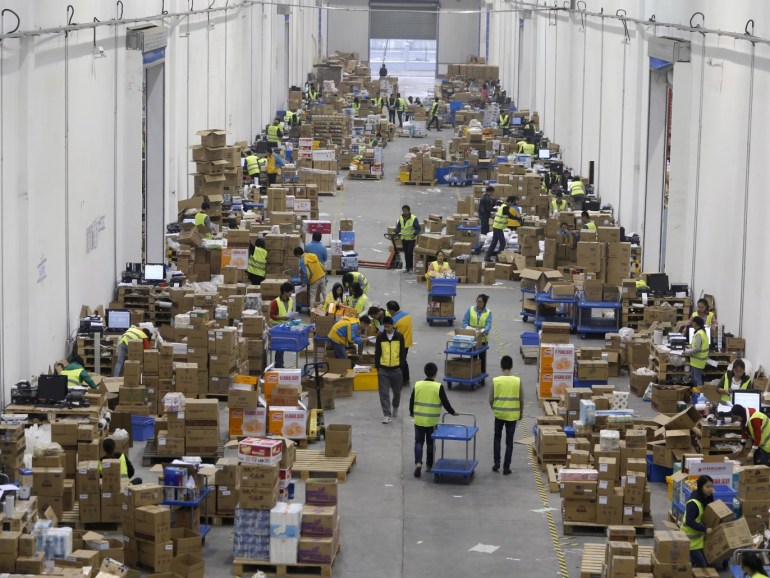Over the past ten years, China has become a major player in foreign direct investments, which are investments aimed at establishing, developing or maintaining a subsidiary overseas, acquiring an important stake or even controlling a foreign company.
In an article published in the French newspaper, Le Monde, researcher Ni Gao says that Chinese investments abroad, which have been thwarted by the epidemic and international tensions, could spread to countries closer to China.
By the end of 2019, more than 27,500 Chinese companies had invested in 188 countries, and Asia, Europe and Latin America are the main destinations for these investments, and sectors such as finance, manufacturing, wholesale and retail trade, and corporate-oriented services accounted for more than 70% of all these investments, in addition to Establishing 44 thousand companies abroad.
Searching for resources and markets and increasing productivity are the three main motivations for advanced countries to choose their foreign direct investment in developing countries. Western companies generally enjoy monopoly or specific advantages that allow them to maintain their competitive edge in the international market.
On the other hand, most companies in emerging countries like China do not enjoy such advantages when they want to thrive abroad.
To achieve this, it uses the means of international expansion to access resources.
In particular, these companies seek to upgrade their technology through the process of internationalization, as a large proportion of Chinese foreign direct investment is sent into Western Europe and North America to this end, and in the long term they aim to improve efficiencies.
Mergers are considered a way for Chinese companies to enter the markets, and this allows them to quickly access the local market and expand their market share internationally, while using many of the resources available in the target company, such as sales networks, patents, technologies, or even brands.
Mergers, the way Chinese companies enter the market (Reuters)
A new economic system
The search for new markets is an important motivation for Chinese companies, and they have adopted a strategy of proximity, by selecting local managers in countries with different cultures, in order to adapt to the needs of consumers.
In 2019, Chinese companies employed more than 2.266 million non-Chinese employees internationally, accounting for 60.5% of the total number of Chinese companies' employees internationally.
But the epidemic has shaken the global economy, doubts about foreign direct investment have increased, and matters are complicated more, especially for Chinese companies that do not have much international experience to work in an unstable situation that negatively affects the economies of the host countries.
In the United States, Chinese foreign direct investment has declined due to trade tensions and the epidemic, and technology and IT companies such as Huawei and TikTok have experienced difficult experiences in this market.
With the change taking place in the White House in the United States, and even if a further deterioration in relations seems unlikely for the time being, the sanctions imposed by Donald Trump on China will not be lifted in the near future.
During his election campaign, Joe Biden indicated that he viewed China as the United States' main technological competitor.
However, the epidemic will reshape a new international economic order by further strengthening the globalization of the global economy, and this may open new horizons for Chinese companies in neighboring countries.
After 3 decades of growth, the degree of industrial dependency and integration between Asian countries is already high, and Asian markets and their middle class continue to grow.
Attractive investment area
This has led to the formation of an attractive investment area for Chinese companies, especially smaller ones, and the cost of transactions abroad may be high at times when information is gathered in geographically and culturally remote locations.
On the other hand, investing in neighboring countries - where consumers enjoy similar culture and behavior - enables them to avoid some difficulties and costs, while at the same time facilitating the procedures and management of companies.
On the political level, the largest multilateral trade agreement in the world, which is the Comprehensive Regional Economic Partnership signed on November 15, 2020 between 15 countries in the Asia-Pacific region, provides for the removal of many tariff barriers, and this agreement will lead to a radical change in cooperation between These countries are strengthening their economic integration.
For Chinese companies, improving technological skills and international expertise are important keys to countering the instability and challenges their development poses.
At the same time, a good understanding of rights, regulations, and environments in host countries can help them move forward with their international operations.
Currently, Chinese companies play a major role in the global economy, and will continue to do so, provided they also meet the communication and transparency requirements that are increasingly emerging on the international stage.

